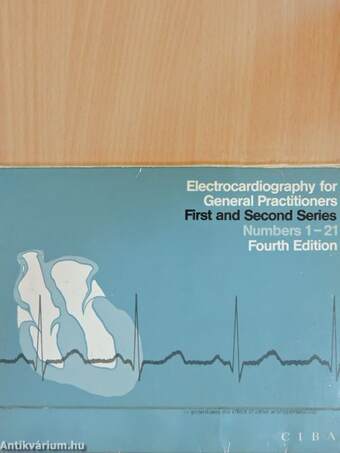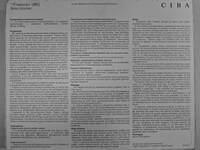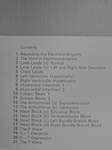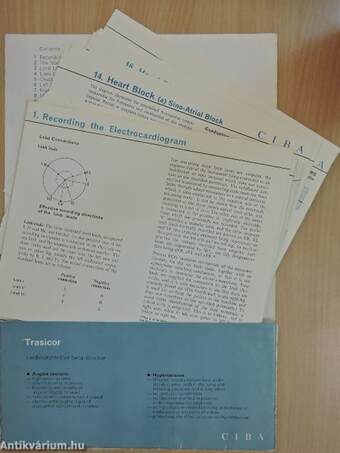1.117.005
kiadvánnyal nyújtjuk Magyarország legnagyobb antikvár könyv-kínálatát
Electrocardiography for General Practitioners 1-21.
First and Second Series/Numbers 1-21
| Kiadó: | CIBA Laboratories |
|---|---|
| Kiadás helye: | Horsham |
| Kiadás éve: | |
| Kötés típusa: | Papírmappa |
| Oldalszám: | 21 oldal |
| Sorozatcím: | |
| Kötetszám: | |
| Nyelv: | Angol |
| Méret: | 17 cm x 21 cm |
| ISBN: | |
| Megjegyzés: | 4. kiadás. Fekete-fehér ábrákkal illusztrálva. |
naponta értesítjük a beérkező friss
kiadványokról
naponta értesítjük a beérkező friss
kiadványokról
Fülszöveg
"Trasicor (80) Beta-blocker Composition and form of issue 1 -(o-Allyloxyphenoxy)-3-isopropylamino-2 -propanol hydrochloride (= oxprenolol hydrochloride): scored tablets of 80mg. Properties By exerting a selective and reversible inhibitory action on stimulation of the beta-adrenergic receptors. Trasicor effectively protecfs the cardiovascular system against excessive adrenergic stimuli and, hence, alsó against the repercussions of emotional stress and of strain induced by environmental factors. It thus enables the heart to work more quietly and more economically, reduces myocardial oxygen consumption, and lowers elevated blood pressure. Trasicor prevents or attenuates not only abrupt rises in blood pressure and heart rate but alsó other undesirable effects of excessive adrenergic stimulation, such as increases in the concentration of free fatty acids and triglycerides in the blood, as well as E.C.G. changes due to stress and to myocardial ischaemia. Trasicor is eminently suitable for... TovábbFülszöveg
"Trasicor (80) Beta-blocker Composition and form of issue 1 -(o-Allyloxyphenoxy)-3-isopropylamino-2 -propanol hydrochloride (= oxprenolol hydrochloride): scored tablets of 80mg. Properties By exerting a selective and reversible inhibitory action on stimulation of the beta-adrenergic receptors. Trasicor effectively protecfs the cardiovascular system against excessive adrenergic stimuli and, hence, alsó against the repercussions of emotional stress and of strain induced by environmental factors. It thus enables the heart to work more quietly and more economically, reduces myocardial oxygen consumption, and lowers elevated blood pressure. Trasicor prevents or attenuates not only abrupt rises in blood pressure and heart rate but alsó other undesirable effects of excessive adrenergic stimulation, such as increases in the concentration of free fatty acids and triglycerides in the blood, as well as E.C.G. changes due to stress and to myocardial ischaemia. Trasicor is eminently suitable for the treatment of angina pectoris because in chronic disorders of coronary blood flow in particular, it is capable of correcting the dísproportion between arterial blood supply and oxygen requirement and of increasing the effort tolerance of the myocardium. Since Trasicor alsó reduces heart rate and myocardial excitability, it can be employed therapeutically to combat tachycardia and to correct certain forms of arrhythmia and extrasystole." The properties displayed by Trasicor justify its use as an integrál part of any antihypertensive regime. A fali in elevated blood pressure already sets in within the first few days of treatment with Trasicor, the antihypertensive effect of which attains its maximum after about 2-3 weeks. Even when prescribed over a very wide dosage rangé, however, Trasicor does not reduce the bloo.gl- pressure to subnormal levels. Concomitant treatment with other antihypertensives potentiates the blood-pressure lowering effect of Trasicor and speeds up its onset of action. Clinical experience suggests that a combination of Trasicor with diuretics (e.g. ©Esidrex, ®Navidrex, ®Hygrotori) and/or peripheral vasödilators (e.g. ®Nepresol) deserves particular preference. Employed in the recommended doses, Trasicor brings elevated blood pressure under effective control without provoking side effects of the type produced by classic antihypertensives. Provided its contra-indications are observed, Trasicor is very well tolerated, even in relatively high dosages. Indications Hypertension due to various causes It is generally preferable to administer the drug in combination with other antihypertensives - in particular with diuretics (e.g. ®Esidrex, ®Navidrex, ®Hygroton) and/or peripheral vasodilators (e.g. ®Nepresol). Angina pectoris Trasicor diminishes the frequency and severity of attacks of anginal pain and improves effort tolerance. To the Medical and Pharmaceutical Professions Disturbances of cardiac rhythm and tachycardia Trasicor exerts a particularly reliable effect in cases of sinus tachycardia and of paroxysmaj supraventricular tachycardia. Supraventricular extrasystole can be corrected with Trasicor i/i a high percentage of cases, and patients with ventricular extrasystole, too, quite often derive benefit from the drug. In arrhythmias accompanied by tachycardia, beta-blockade with Trasicor serves primarily to reduce the heart rate. It alsó succeeds in producing a more regular heart beat in somé cases of paroxysmal atrial flutter or fibrillation. Tachycardia and disturbances of cardiac rhythm due to overdosage of digitális, hyperthyroidism, or phaeochromocytoma usually show .a very good response to Trasicor. In phaeochromocytoma, the drug should preferably be administered togethei with ®Regitine. Functional cardiovascular disorders due to excessive sympathetic stimulation e.g. cardiac neurosis and hyperkinetic heart syndrome. Idiopathic, hypertrophic subaortic stenosis In this rare disease, Trasicor brings about a considerable improvement in haemodynamic conditions. Contra-indications Atrioventricular block, marked bradycardia, heart failure refractory to digitális, obstructive pulmonary diseases, uraemia, and metabolic acidosis. Beta-blockers should not be prescribed during pregnancy until adequate experience of their use in pregnant patients has been acquired. Dosage The tablets should be swallowed whole together with a little liquid. For the treatment of hypertension the initial daily dosage is 160mg, administered in two divided doses. If necessary, this dosage can be doubled after one week. Particularly in cases where the drug is given in combination with a diuretic with ®Nepresol, or with other antihypertensives, daily doses of 1 60mg to 320mg usually suffice. In angina pectoris, treatment should be initiated with 1 tablet twiee daily, which will prove adequate in many cases. Effort tolerance can usually be improved still further by increasing the dosage. Milder forms of angina pectoris, as well as anginal symptoms of functional origin, may already show a good response to lower doses. In functional cardiac disorders caused by overstimulation of the sympathetic nervous system, as well as in disturbances of cardiac rhythm, daily doses of up to 80mg are generally sufficient. Side effects Provided the contra-indications are observed, cardiac and bronchial side effects very seldom occur. Gastro-intestinal upsets and dizziness may occur, especiaily at the start of treatment; these side effects, however, are of a mild nature and rarely necessitate a temporary reduction in the dosage. Even in patients receiving long-term treatment with high doses, neither blood counts nor tests of hepatic and renal function havedisclosed any pathological findings. C I B A Note Treatment with Trasicor should be given only under medical supervision. In the presence of heart failure, sympathetic tone has to be kept at a level sufficient to maintain cardiac performance. Although the effect of beta-blockade on the heart muscle is tempered by the mild intrinsic sympathomimetic activity of Trasicor, patients suffering from heart failure require adequate digitalisation (supplemented, if necessary, by administration of a diuretic). Trasicor does not interfere with the effect exerted by digitális on the force of contraction of the heart muscle. In exceptional cases where pronounced bradycardia occurs, the drug should be withdrawn; as a countermeasure, 1 mg atrophine sulphate should be given intravenously. If this fails to increase the heart rate sufficiently, recourse may be had to a beta-stimulating sympathomimetic agent (e.g. isoprenaline), the use of which - in theform of an aerosol -is alsó recommended in rare instances where bronchospastic reactions occur. In the very unusual event of the patient's showing a parai doxical rise in blood pressure in response to beta-blockade;. he must be transferred to treatment with other types of antihypertensive. Beta-blockers are not usually indicated in the acute phase of myocardial infarction; but in subsequent stages of this disease Trasicor can rendervaluable assistance in appropriate cases (for example. if disturbances of cardiac rhythm occur). Treatment with beta-blockers is liable to mask the symptoms of hypoglycaemia and alsó to affect carbohydrate metabolism. In patients with labile or insulin-dependent diabetes in particular, it may therefore be necessary to readjust the dosage of hypoglycaemic medication. When discontinuing treatment with a beta-blocker, one should as a rule withdraw the drug gradually. i.e. over a period of 7-10 days. because abrupt interruption of the medication - particularly in cases of ischaemic heart disease - may be followed by an acute deterioration in the patient's condition. In patients undergoing elective surgery. it may be considered desirable to employ a beta-blocker as premedication; by shielding the heart from the effects of stress, the betablocker may serve to guard against excessive sympathetic stimulation, which is liable to provoke such cardiac disturbances as arrhythmia or acute coronary insufficiency. In a patient under beta-blockade, the anaesthetic selected should be one exhibiting as little negatíve inotropic activity as possible (halothane/nitrous oxidé); if, on the other hand,, inhibition of sympathetic tone during the operatión is regarded as undesirable, the beta-blocker can be withdrawn gradually prior to surgery. Packages 40 and 200 tablets ® denotes registered trademark CIBA Laboratories, Horsham, West Sussex. D101 2 VisszaTémakörök
- Orvostudomány > Belgyógyászat > Kardiológia
- Idegennyelv > Idegennyelvű könyvek > Angol > Orvostudomány
- Orvostudomány > Belgyógyászat > Általános > Diagnosztika
- Orvostudomány > Belgyógyászat > Általános > Idegennyelvű
- Orvostudomány > Belgyógyászat > Általános > Betegségek > Szív- és érrendszeri
- Orvostudomány > Orvosi idegennyelvű könyvek > Belgyógyászat
Megvásárolható példányok
Nincs megvásárolható példány
A könyv összes megrendelhető példánya elfogyott. Ha kívánja, előjegyezheti a könyvet, és amint a könyv egy újabb példánya elérhető lesz, értesítjük.






